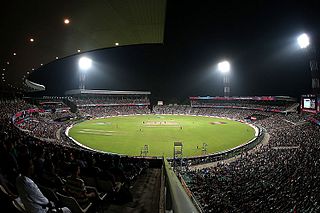
Ajit Agarkarpronunciation (help·info) is a former Indian cricketer, who had represented India in more than 200 international matches in all three formats of the game. He is the third highest wicket-taker for India in ODIs and has represented India in the 1999 Cricket World Cup, 2007 Cricket World Cup but didn't feature in any of the world cup matches in the 2003 Cricket World Cup where India reached into the finals.
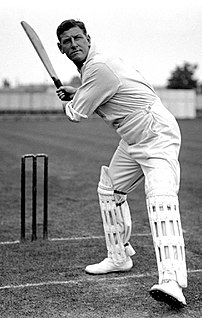
Samuel Moses James Woods was an Australian sportsman who represented both Australia and England at Test cricket, and appeared thirteen times for England at rugby union, including five times as captain. He also played at county level in England at both soccer and hockey. At cricket—his primary sport—he played over four hundred first-class matches in a twenty-four-year career. The majority of these matches were for his county side, Somerset, whom he captained from 1894 to 1906. A. A. Thomson described him thus: "Sammy ... radiated such elemental force in hard hitting, fast bowling and electrical fielding that he might have been the forerunner of Sir Learie Constantine."
Robert Arnold Lockyer Massie is a former Australian cricketer who played in six Tests and three One Day Internationals (ODIs) from 1972 to 1973.

Thomas Edmund O'Dwyer was an Australian cricketer who played 15 first-class matches for Western Australia between 1946 and 1960. He is best known as the last player to dismiss Donald Bradman in a first-class match in Australia. O'Dwyer was born in Bridgetown, Western Australia, to John and Isabel O'Dwyer. His father was manager of the local Lands Department office. O'Dwyer's family moved to Perth when he was five, and he attended St. Patricks College. He began playing cricket with the North Perth C-grade team, and later played for Subiaco and Mount Lawley in the WACA District competition.
In the 1970 English cricket season, a scheduled South African tour was cancelled for political reasons. As this meant there would be no international cricket in England that season, a Rest of the World team was assembled to play a series of five-day matches against England. At the time, they were played as Test matches, but that status was later revoked by the International Cricket Conference (ICC) and they are now termed unofficial Tests, though still officially first-class matches.
Ross Edwards is a former Australian cricketer. Edwards played in 20 Tests for Australia, playing against England, West Indies and Pakistan. He also played in nine One Day Internationals including the 1975 Cricket World Cup series. He was a right-handed batsman and superb cover fielder as well as a part-time wicket-keeper.

Kenneth John Wadsworth was a New Zealand cricketer who played 33 Tests and 13 One Day Internationals for New Zealand as a wicket-keeper. Wadsworth also played for Nelson in the Hawke Cup.
David Robert O'Sullivan played 11 Tests and three One Day Internationals for New Zealand between 1973 and 1976. He played first-class cricket from 1971 to 1985.
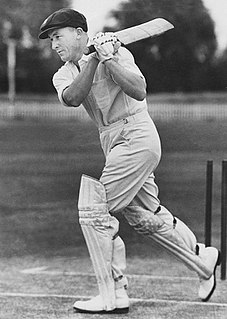
Ronald Arthur Hamence was a cricketer who played for South Australia (SA) and Australia. A short and compact right-handed batsman, Hamence excelled in getting forward to drive and had an array of attractive back foot strokes. Already the youngest Australian to play district cricket, he was also, from the death of Bill Brown in 2008 until his own death in 2010, the oldest surviving Australian Test cricketer.
Mark Nicholas Lathwell is a former English cricketer who played in two Test matches in 1993. Lathwell played the entirety of his first-class cricket career for Somerset County Cricket Club.

When the First World War ended in November 1918, thousands of Australian servicemen were in Europe as members of the First Australian Imperial Force (AIF) and many remained until the spring of 1919. In England, a new first-class cricket season was planned, the first since 1914, and an idea that came to fruition was the formation of an Australian touring side made up of servicemen. Agreement was reached with the Australian Corps HQ in London, commanded by Field Marshal William Birdwood, 1st Baron Birdwood, and the Australian Imperial Force Touring XI was formed, initially under the captaincy of pre-war Test player Charlie Kelleway. Kelleway departed after only six matches following a dispute about the fixtures list. A players' meeting elected future Test player Herbie Collins as team captain for the remainder of the tour, despite the fact that Collins' military rank was lance corporal and there were seven officers in the party. The bulk of the team remained intact for nearly nine months from May 1919, playing 33 matches in Great Britain, ten in South Africa on their way home and then another three in Australia itself before disbanding in February 1920. Of the 46 matches, 39 are adjudged first-class and the team had only four defeats, all of these in England. The players lived on their army pay and all profits from gate money went to an AIF Sports Control Board.

The Philadelphian cricket team was a team that represented Philadelphia, Pennsylvania, in first-class cricket between 1878 and 1913. Even with the United States having played the first ever international cricket match against Canada in 1844, the sport began a slow decline in the U.S. This decline was furthered by the rise in popularity of baseball. In Philadelphia, however, the sport remained very popular and from the end of the 19th century until the outbreak of World War I, the city produced a first class team that rivaled many others in the world. The team was composed of players from the four chief cricket clubs in Philadelphia–Germantown, Merion, Belmont, and Philadelphia. Players from smaller clubs, such as Tioga and Moorestown, and local colleges, such as Haverford and Penn, also played for the Philadelphians. Over its 35 years, the team played in 88 first-class cricket matches. Of those, 29 were won, 45 were lost, 13 were drawn and one game was abandoned before completion.
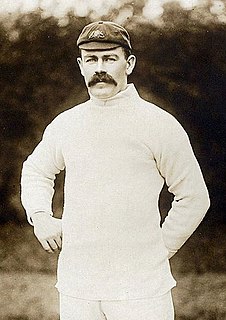
The Australian cricket team toured England during the 1902 English cricket season. The five-Test series between the two countries has been fondly remembered; in 1967 the cricket writer A. A. Thomson described the series as "a rubber more exciting than any in history except the Australia v West Indies series in 1960–61". Australia had won the previous three Test rubbers between the two countries, and now won their fourth successive series, by two matches to one with two draws. In the process they "beat the records of all their predecessors in the country" by losing only two of 39 matches during the tour, their defeats being against England in the Fifth Test and in the first of their two fixtures against Yorkshire. The remaining 37 matches gave 23 wins for Australia and 14 draws.

The Australia national cricket team toured England in 1884. The team is officially termed the Fourth Australians, following three previous tours in the 1878, 1880 and 1882 seasons. The 1884 tour was a private venture by the thirteen players who each invested an agreed sum to provide funding, none of Australia's colonial cricket associations being involved. Billy Murdoch captained the team and George Alexander acted as player-manager. The Australians played a total of 32 matches in England, 31 of which have first-class status.
Edward "Eddie" Philip Illingworth is a former Australian cricketer who played five first-class matches for Victoria between 1962 and 1964. A right-arm medium pace bowler, Illingworth was best remembered for being no-balled for throwing in a Sheffield Shield match against South Australia in November 1964 by umpires Col Egar and Jack Ryan. His selection for Victoria was made more controversial by the fact that he had been called at district level for throwing prior to his first-class debut. Away from first-class cricket, Illingworth had a successful career for Fitzroy in Victorian Premier Cricket, where he remains the eighth highest wicket-taker of all time, with 599. He was named the club champion three times, and later served for seven years as a board member of the Victorian Cricket Association.
Brent Avis Hardcastle Palfreyman is a former Australian first-class cricketer who played for Tasmania.
Herbert John Knutton was an English cricketer. Knutton was a right-handed batsman who bowled right-arm fast. He was born at Coventry, Warwickshire.
Henry Russell Crouch was an English cricketer. Crouch was a right-handed batsman who bowled right-arm medium pace. He was born at Calcutta in the British Raj.
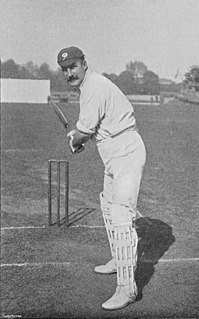
Lord Hawke selected a cricket team of ten amateurs and two professional players to tour Australia and New Zealand from November 1902 until March 1903. After an opening game in San Francisco, the tour began of eighteen matches - seven of them considered first-class - in New Zealand followed by three further first-class games in Australia. Hawke's team was the first to tour Australasia with New Zealand as the primary destination and, as was the norm at the time, was privately run and funded. The Australian leg of the tour was a "profit making venture", however the games in New Zealand were scheduled at the behest of the New Zealand Cricket Board in order to raise the profile of cricket in the country. Two of them were against a New Zealand cricket team, before its international Test status. The inclusion of such games on the tour were considered "a sign that cricket in New Zealand was starting to be taken more seriously, and a move towards official international status was possible."
